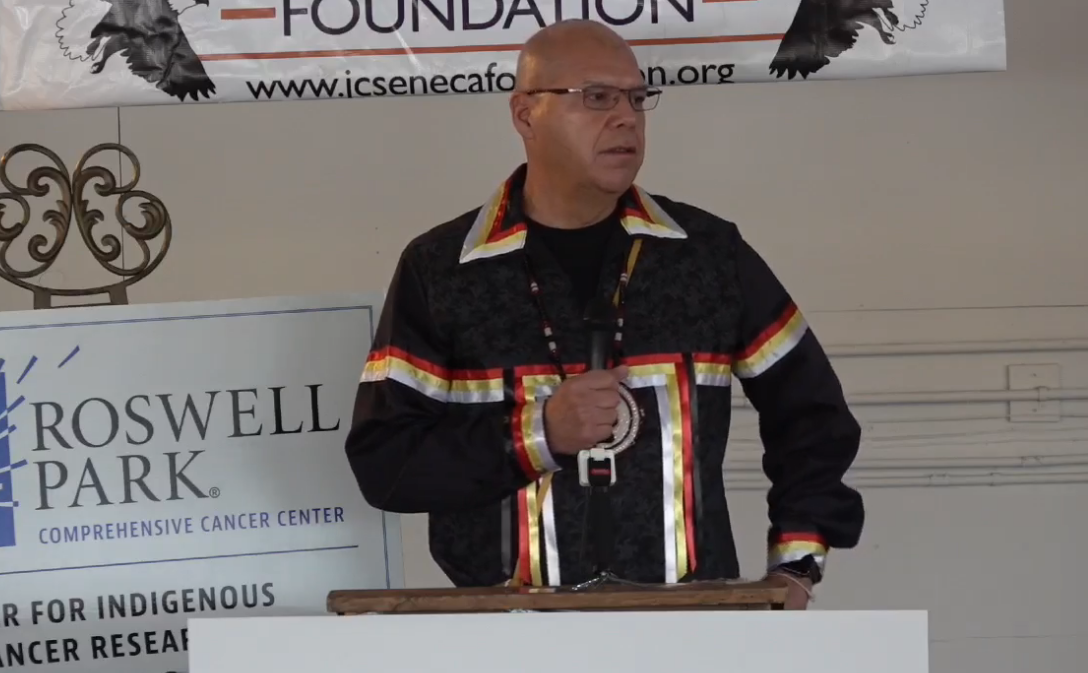
- Details
- By Kelsey Turner
The J.C. Seneca Foundation (JCSF) is partnering with the Center for Indigenous Cancer Research (CICR) at Roswell Park Comprehensive Cancer Center in Buffalo, New York. The partnership, announced this morning, aims to support people in the Seneca Nation and surrounding communities dealing with cancer diagnoses and treatment.
JCSF, founded in 2012 by Seneca Nation businessman J.C. Seneca, is dedicated to forming partnerships that promote the physical, emotional, intellectual and spiritual well-being of Native people.
Want more Native News? Get the free daily newsletter today.
“Statistics prove that Native People are at greater risk than the majority of Americans when it comes to a number of diseases, mental health issues, and addictions,” Seneca said in a press release Monday. “They also are the last on the list when it comes to affordable health insurance that could provide needed care and treatments.”
The partnership’s goal is to offer patient navigator and screening services at Seneca’s Native Pride Business on the Tallchief Territory in Irving. These services will help people on the Cattaraugus and Allegany territories and surrounding communities learn about and seek treatments for “the many forms of cancers afflicting our people,” Seneca said.
Data from the Centers for Disease Control and Prevention (CDC) shows American Indians and Alaska Natives have significantly higher rates of colorectal, kidney, liver, lung, and stomach cancers than non-Hispanic white people. These cancer patterns are in part due to limited health care access and institutionalized racism, the CDC website says.
Higher levels of smoking and pre-existing rates of obesity, diabetes, and chronic liver and kidney disease within Native communities can also complicate cancer cases and treatments, the press release stated.
The JCSF and CICR partnership aims to lower these cancer rates by coordinating educational events, hosting health screenings, and developing action plans specific to Indigenous people’s needs.
Funding received by Roswell Park last year provides a tailored program of breast and prostate cancer screening education, continuum of care and management of co-occurring conditions. To help people navigate the health care system, Roswell Park installed six full-time patient navigators in high-need rural areas and Native Nations across New York State, the press release stated.
“We’re that friendly face that you can come and talk to about these crucial topics,” said CICR Community Patient Navigator Marissa Haring in the press release. “We can get you screened and be there to answer your questions so you can take charge of your health.”
Haring started her twice-monthly sessions open to the community at Native Pride in December.
According to Roswell Park CICR Director Dr. Rodney Haring, the center is the first of its kind in the Northeast that aims to honor the values of Indigenous knowledge, sovereignty and respect for the environment through community-driven partnerships.
“We will learn and apply lessons from both academic medicine and Indigenous knowledge,” Dr. Haring said in the press release. “Which will not only lead us to cutting-edge cancer services for, and with, Indigenous populations, but to translatable science, medicine and cancer care for Indigenous territories, Nations and populations worldwide.”
More Stories Like This
New Mexico Will Investigate Forced Sterilization of Native American WomenUSDA Expands Aid for Lost Farming Revenue Due to 2025 Policies
Two Feathers Native American Family Services Wins 2026 Irvine Leadership Award
Bill Would Give Federal Marshals Authority to Help Tribes Find Missing Children
Indian Health Service to Phase Out Mercury-Containing Dental Amalgam by 2027
